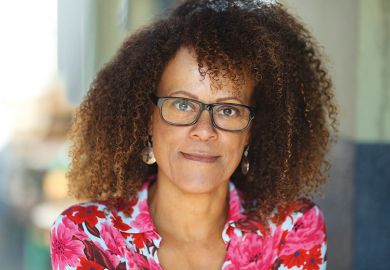Bernadine Evaristo’s Girl, Woman, Other (Hamish Hamilton) is one of the outstanding publications of 2019. This dazzling piece of experimental writing centres on 12 black British women. Their stories are brought to life in a series of interconnected chapters that weave around the opening at the National Theatre of a new play – The Last Amazon of Dahomey – written by one of the characters. If the play’s title signals Evaristo’s interest in the African diaspora, the novel’s non-hierarchical form gives equal weight to a wide range of experiences. But it is her distinct lyricism that makes Girl, Woman, Other unputdownable and a joy to read. Next, I’m looking forward to Esther Newton’s My Butch Career: A Memoir (Duke, 2018). Newton, an American anthropologist, is perhaps most famous for her ground-breaking essay on “the mythic mannish lesbian”. My Butch Career charts her coming of age at a time when same-sex sexuality and gender nonconformity were severely ostracised and attacked. Today, many such attacks focus on trans people, often using versions of older homophobic language and ideas. I am curious to see what we can learn from Newton not only about butch history and gender policing, but also about forming political alliances across LGBTQ+ communities.
Heike Bauer, professor of modern literature and cultural history, Birkbeck, University of London
I have recently returned to Joyce Carol Oates’ 1992 novella Black Water. This is a moving and insightful depiction of power dynamics in the relationships between young women and older powerful men, based on the death of Mary Jo Kopechne at Chappaquiddick in 1969 and the involvement of Ted Kennedy. This has never felt more relevant, and having the young woman as the narrator draws attention to the mindset of this frequently overlooked participant. My Christmas stocking will, I hope, contain Debbie Harry’s Face It: A Memoir (HarperCollins, 2019). I have loved Blondie since the 1970s and can’t wait to read Harry’s take on her iconic status. She has always been a unique combination of Marilyn Monroe and Siouxsie Sioux, with a jazz-punk delivery that still feels so fresh. I will read her memoir whilst rewatching all the old Blondie videos and so immerse myself in her style and vision.
Lucy Bolton, reader in film studies, Queen Mary University of London
It has been a cruel winter. Harold Bloom, Clive James and Jonathan Miller have all been taken from us. More modest, but no less important, is Elaine Feinstein – a Russianist, biographer, novelist and poet – who died shortly before this grand troika. Feinstein’s emotional hinterland is captured beautifully in The Clinic, Memory: New and Selected Poems (Carcanet, 2017), which was written while she was undergoing treatment for cancer. She was a unique poet-storyteller whose memories live on with visceral clarity in this collection. As she puts it, hers is a “spoken voice flowing down the page”.
Who can replace the generation of grand old men such as Bloom, James and Miller who were given licence to speak for Western culture? Such figures have rightly gone out of fashion. But there are still younger activist thinkers who address with clarity and intelligence much of what characterises our age. Michael Rothberg is one whose books are eagerly anticipated and do not disappoint. The Implicated Subject: Beyond Victims and Perpetrators (Stanford, 2019) helps us to reconsider our “vicarious responsibility for things we have not done”, in the words of Hannah Arendt. What better way to address the legacies of slavery, colonialism and genocide that continue to disfigure our world?
Bryan Cheyette, professor of modern literature and culture, University of Reading
I saw the novelist Melissa Harrison speak about her book All Among the Barley (Bloomsbury, 2018) at the Tetbury Literature Festival this year, and was enchanted. Her novel is an equally captivating tale of Edie, a disempowered 13-year-old in 1933 who seeks agency in both nature’s power and her own. It is full of the rural rituals of life on Wych Farm: wide skies, orchards, hens, horses and harvest. Above all, Harrison’s story is important because, set between the two wars, it explores how fascism works as a slow drip-feed of nationalism, corrupting reasonable minds.
Over Christmas, when everything feels a little more magical, I’m looking forward to reading Thomas Waters’ recently published Cursed Britain: A History of Witchcraft and Magic in Modern Times (Yale, 2019). This is based on an extensive period of research into black magic in Britain from the 1800s to the present day. It seems appropriate to read something that studies the darker power of belief at a time of year when some adults try to convince children that a supernatural gentleman transgresses time and space to deliver presents.
Poppy Corbett, research associate in creative writing, University of Bristol

Poet and creative writing teacher Kate Clanchy’s Some Kids I Taught and What They Taught Me (Picador, 2019) is a powerful reminder of what teaching, and literature teaching especially, ought to be about. Each chapter uses Clanchy’s students’ poems, demonstrating creative and moving responses to the complicated and challenging worlds the students inhabit. Clanchy’s thoughts about the poems – and the students – confront and painfully demolish many of the clichés and self-deceptions about education. What remains is, in turns, more honest, more painful and more hopeful. Salutary for university as well as school educators. My unopened gift to myself is Jonathan Rée’s Witcraft: The Invention of Philosophy in English (Allen Lane, 2019). Rée’s thought, and so his prose, is always lucid and I find his method – “philosophical history”, which draws on autobiography, fiction, historical research, philosophy and more – produces deeply rewarding, multifaceted and highly enjoyable work.
Robert Eaglestone, professor of comparative literature and thought, Royal Holloway, University of London
I happened across Chris Patten’s First Confession: A Sort of Memoir (Allen Lane, 2017) this year. I have rarely been tempted by the memoir of a Tory politician. But this turned out to be something very different. It is in essence a well-written and thoughtful musing on the nature of politics and identity. His observations, from his own beginnings as a Catholic boy from a modest London suburb to extended travels across the US and then high-level politics, are finely crafted and full of wisdom. In these days of pygmy politicians on all sides, reading Lord Patten’s insights on weathering successive political dramas from Cabinet minister to Hong Kong governor, not to mention his later roles at the BBC and now the University of Oxford, felt like something from a gentler and better age.
The book I will turn my attention to as 2020 approaches is Susannah Zuboff’s The Age of Surveillance Capitalism: The Fight for a Human Future at the New Frontier of Power (Profile, 2019). I had meant to read it this year but, in all honesty, its daunting size as it looms on my shelf has been putting me off. There have been many books already on the digital revolution and the overweaning power of the tech giants, some much better than others. But, by all accounts, Zuboff has produced one of the most definitive and original.
Suzanne Franks, professor of journalism, City, University of London
As the winter darkness closes in around us, it is comforting to return to a book that is warmly familiar. Guards! Guards! (1989) by Terry Pratchett is one such work, embodying much that is best about his writing. To me, it marks a balance point between the cartoonish slapstick of the first Discworld novels and the much darker later works. Against the shockingly recognisable backdrop of Unseen University, the incisive political clarity of steely Lord Patrician Vetinari, sinister machinations of a secret society and the beginnings of a new hope for disillusioned protagonist Sam Vimes combine to create a hugely rich, messily vivid world. A world whose callous eccentricities seem more plausible with each glance at the news, as every city seems to ease closer to the mean streets of Ankh-Morpork. I’m hoping for a different sort of escapism from Journeys in the Wild: The Secret Life of a Cameraman by Gavin Thurston (Orion, 2019). This recent offering from a wildlife photographer, who has contributed to television series such as Blue Planet II and Planet Earth II, promises to rekindle dreams of travel and environmental adventure among those of us who look at a few dramatic seconds of highly impressive wildlife screen-time and try to picture the weeks of planning, days of discomfort and hours of frustration that were necessary to bring that fleeting – but impactful – image to us. A foreword by David Attenborough suggests that this book will not disappoint.
John Gilbey teaches in the department of computer science at Aberystwyth University
Jo Baker’s The Body Lies (Doubleday, 2019) is the stuff of nightmares. And the sinister male student who begins to weave his young female lecturer into his fiction is just the tip of the iceberg. When the narrator moves from London to the rural English countryside it is to take up an academic position she has been chasing for years. However, as the work piles on to her desk in alarming quantities – in order to free up the time of her male colleagues – she realises that this position might not be a dream come true after all. The thriller element of this brave and incisive novel kept me turning the pages; but it was the painfully realistic portrayal of the challenges facing women in academia that had me reaching for a nightlight. This Christmas break I’ll be dusting off my broomstick and delving into Lindy West’s The Witches Are Coming (Hachette, 2019). Advertised as an examination of rape culture in modern America, this collection of essays claims to turn on its head the pervasive idea that feminist movements such as #MeToo constitute a “witch-hunt”. With chapter headings including “Is Adam Sandler funny?”, laughs are surely guaranteed, but I suspect these won’t detract from a sombre and necessary rallying cry for troubling times.
Hetta Howes, lecturer in medieval and early modern literature, City, University of London
For me, a 2019 standout was Anna Stilz’s Territorial Sovereignty: A Philosophical Exploration (Oxford University Press). Stilz advances a Kantian account of states as loci of individual human freedoms without the commitments of libertarian individualism. In the process, she defends the global state system as desirable because it can secure individual autonomy through political practices, and can also be reconciled with cosmopolitan interests such as human mobility. Looking ahead, Frank J.B. Stillwell’s The Political Economy of Inequality (Polity, 2019) beckons from my reading stack – which I customarily plan to tackle over the holiday period, but rarely manage. However, after reading just the opening pages I can already anticipate the book’s contribution to my own research. Although Stillwell acknowledges that this is not the first work in recent years on this complex subject, he also notes that scholarly projects build on each other to bring us closer to understanding and social change. This will be just what I need in the new year after eating my fill of festive treats and bingeing on my back-catalogue of television.
Matthew R. Joseph is a PhD candidate at the University of Sydney, Australia working on the philosophy of immigration and collective agency

This year’s best read was George Eliot’s Middlemarch, read slowly in eight monthly parts in her bicentenary year. Eliot is brilliant on the difficult but absolute necessity of being truthful, as is another voice from the Midlands, Jess Phillips, MP. Her Truth to Power: 7 Ways to Call Time on B.S. (Monoray, 2019) resounds with kindness, humour and unerring decency. It is based on hard-won experience and insists that “speaking truth to power” is crucial, for silence “is the victory call that brings joy to the ears of every person or institution that ever sought to control you”.
Having read his collection of art criticism, Keeping an Eye Open, earlier this year, I’m looking forward to Julian Barnes’ The Man in the Red Coat (Cape, 2019), which was inspired by John Singer Sargent’s 1881 painting Dr Pozzi at Home. Barnes mines the finest details of the painting for the stories that they hold. His intimate scrutiny of the portrait of the beautiful Dr Pozzi produces a biography of “a kind of hero” that brings together leading figures in French and British art, science and society. It is also a celebration of the past richness and creativity of Anglo-French relations for a present threatened with “miserable self-isolation”.
Gail Marshall, professor of Victorian literature and culture, University of Reading
Both my books clearly indicate that I have hit the age of nostalgia. I have just finished reading Abby Waterman’s memoir, Woman in a White Coat (CreateSpace, 2017). This describes her childhood growing up deep inside the pre-war Jewish community of the East End; the struggles of her immigrant parents to make a living in a cold, small tenement flat; and her persistence in becoming educated and eventually reaching the top of her profession as a Harley Street dentist and a consultant pathologist, while still fulfilling the expectations of “a good Jewish family” and bringing up four children. Many of the challenges described in Waterman’s book must have faced my mother and her five siblings as they struggled to make a living, maintain their orthodox observance and eventually move beyond the ghetto thanks to education, education, education. I am looking forward to dipping into Dave Thomas and Mike Smith’s Bob Lord of Burnley: The Biography of Football’s Most Controversial Chairman (Pitch, 2019). Lord was the dominant chairman of Burnley Football Club during the 1950s and 1960s. This was a period prior to commercialisation when the game was run by powerful chairmen and managers, and when players mixed with the fans in the post-match pubs. The book is as much about the changing sociology of Britain as about football itself and promises to be an entertaining read for someone who began his supporting career in the 1960s and has monitored the changes in the game over the past half-century.
David Newman, professor in the department of politics and government, Ben-Gurion University, Israel
The most timely book I’ve read this year (admittedly, it’s by my sister, Selina O’Grady) is In the Name of God: A History of Christian and Muslim Intolerance (Atlantic, 2019). Given the dispute about anti-Jewish attitudes in the Labour Party, and the protests by religious parents against raising LGBT issues in primary schools, it is vital to have a sense of how centuries-long religious and political divisiveness has got us all to where we are. This book not only outlines this terrible history, but questions the value of tolerance, which is liable to be grudging and patronising. Jeremy Corbyn has just been saying that he dislikes tolerance and prefers respect. Perhaps he has been reading In the Name of God. If not, he ought to. Western philosophy, when it began in Ancient Greece, was the “love of wisdom” that underlay all enquiry. I’m looking forward to Scott Soames’ The World Philosophy Made: From Plato to the Digital Age (Princeton, 2019). According to the advance publicity, this demonstrates and discusses how indispensable conceptual clarification is (and has been) to scientific enquiry. It will, I hope, help dispel recent absurd rumours that philosophy is either redundant or dead.
Jane O’Grady is a co-founder of the London School of Philosophy and taught philosophy of psychology at City, University of London
I know why I should read more books with no bearing on my research, and there’s a stack of them vying for suitcase space as I prepare to fly into LA on 27 December before driving east to see in the new year in Las Vegas and then returning to the West Coast. In preparation, I recently read Shawn Levy’s gossipy, well-written The Castle on Sunset: Love, Fame, Death and Scandal at Hollywood’s Chateau Marmont (Weidenfeld & Nicolson, 2019). Castle is a biography of the hotel that has dominated the infamous Sunset Strip in LA for generations, remaining tight-lipped about the shenanigans of its rich, famous and louche guests. While we’re overseas, a book that will definitely make the cut – it will in all likelihood be upgraded to cabin bag status – is novelist Tracy Chevalier’s latest, A Single Thread (Borough, 2019). I’ve loved her oft-imitated, but never equalled, historical fiction for years now. Her Falling Angels is probably my favourite (less well known than Girl with a Pearl Earring, but easily as good), and I have high holiday hopes for her new one. All I need to do now is to dispel the voices of pleasure-reading guilt that I know will be there: “Why aren’t you writing?” they’ll demand or, worse, “How can you use this text in your teaching?” I’ll do all I can to silence them with a fine bourbon and a view over the shimmering lights of Tinseltown.
Emma Rees, professor of English and gender studies, University of Chester
Register to continue
Why register?
- Registration is free and only takes a moment
- Once registered, you can read 3 articles a month
- Sign up for our newsletter
Subscribe
Or subscribe for unlimited access to:
- Unlimited access to news, views, insights & reviews
- Digital editions
- Digital access to THE’s university and college rankings analysis
Already registered or a current subscriber?


